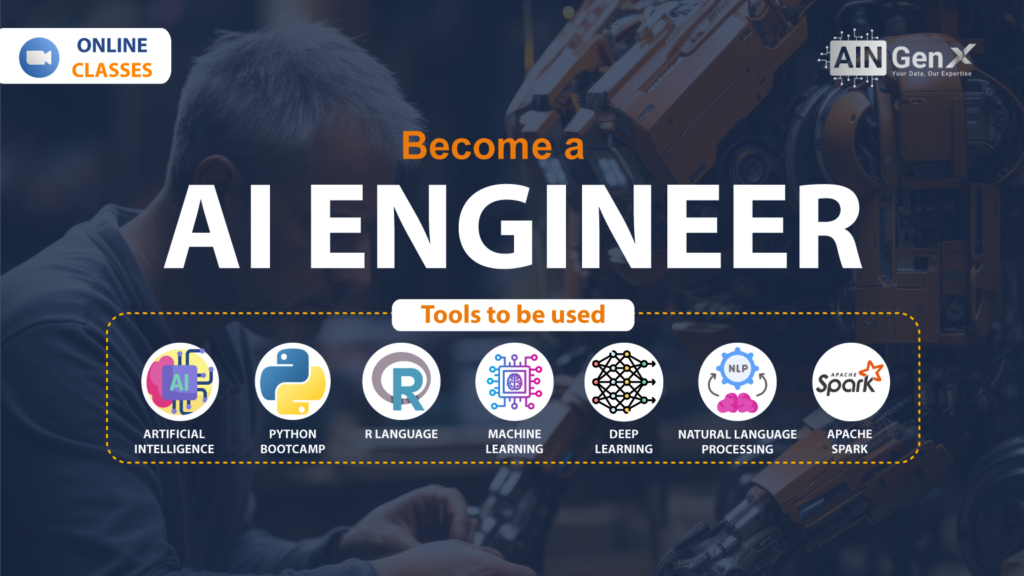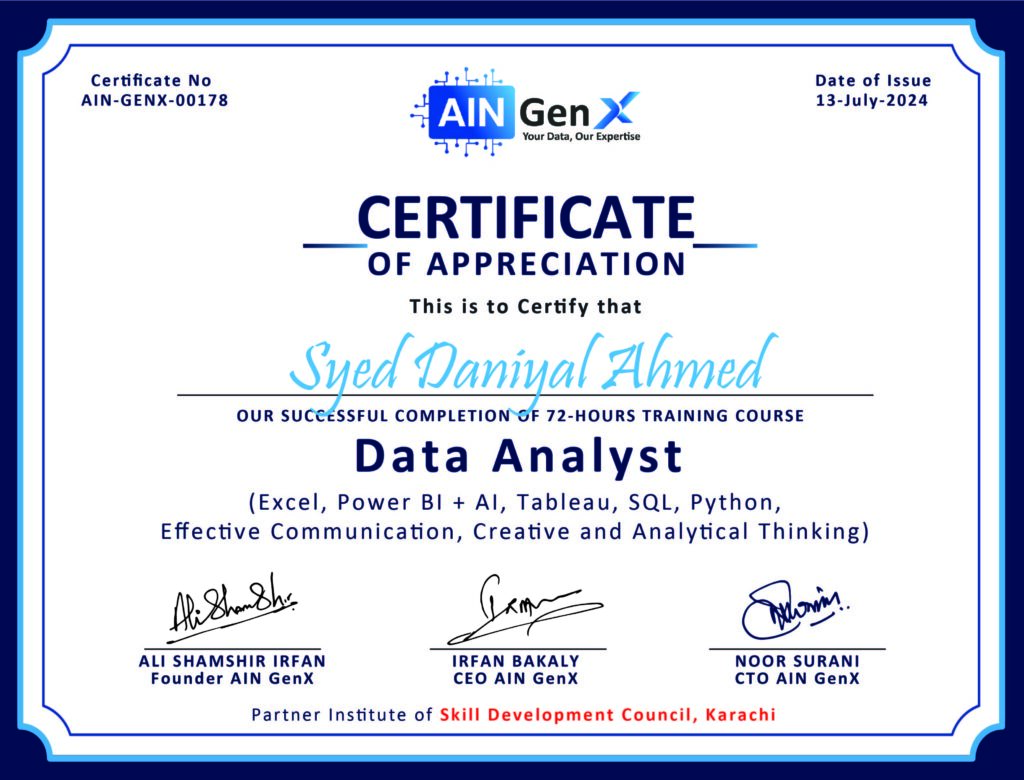Become a AI Engineer
Artificial Intelligence | Python Bootcamp |
R Language | Machine Learning |
Deep Learning | Natural Language Processing |
Apache Spark

Become a AI Engineer
Artificial Intelligence | Python Bootcamp | R Language | Machine Learning | Deep Learning | Natural Language Processing | Apache Spark
Artificial Intelligence (AI) is transforming industries, making AI engineering one of the most sought-after careers. By mastering AI, you gain the skills to design intelligent systems that solve complex problems, enhancing efficiency and innovation. AI engineers enjoy high demand, lucrative salaries, and endless opportunities to work across diverse fields like healthcare, finance, and tech. The role offers a chance to shape the future, creating impactful solutions for global challenges. Learning AI equips you with cutting-edge knowledge, making you a key player in the digital revolution.
Module 1: Intro to AI
• What is AI
• Impact of AI
• Future Trends
• Application
Module 2: R Language
Introduction to R and RStudio
• Overview of R Language
• What is R and its Applications in Data Analytics?
• Installing R and RStudio
• Introduction to the RStudio Interface
• Basic R Syntax
• Variables and Data Types
• Basic Operations
Data Structures in R
• Vectors, Matrices, Lists, and Data Frames
• Creating and Manipulating Vectors
• Understanding Matrices
• Working with Lists
• Introduction to Data Frames
Data Manipulation with dplyr
• Introduction to the dplyr Package
• Installing and Loading dplyr
• Basic Data Manipulation
• Filtering Rows with filter()
• Selecting Columns with select()
• Arranging Rows with arrange()
• Mutating Data with mutate()
• Summarizing Data with summarize()
Basic Data Visualization with ggplot2
• Introduction to ggplot2
• Installing and Loading ggplot2
• Creating Basic Plots
• Scatter Plots, Line Plots, Bar Plots
• Customizing Plots
• Adding Titles, Labels, and Themes
Module 3: Python
Introduction to Python
• Overview of Python and its Applications
• Why Python for Data Analysis?
• Setting Up Python Environment
• Introduction to Google Colab
Python Basics
• Python Syntax and Basics
• Variables, Data Types, and Operators
• Control Structures: if-else, loops
• Functions and Modules
• Defining and Calling Functions
• Importing and Using Modules
Data Structures and Handling
• Working with Lists, Tuples, and Dictionaries
• Introduction to NumPy
• Creating and Manipulating Arrays
• Array Operations and Broadcasting
Working with Data Sources
• Reading from and writing to a csv
• Reading documentation
• API calls
• Data Ethics
Data Manipulation with Pandas
• Introduction to Pandas
• DataFrames and Series
• Data Loading, Cleaning, and Preparation
• Reading and Writing Data (CSV, Excel, etc.)
• Handling Missing Data
• Data Transformation and Filtering
Data Analysis and Exploration
• Exploratory Data Analysis (EDA)
• Descriptive Statistics
• Data Visualization with Matplotlib and Seaborn
• Plotting and Customizing Graphs
• Grouping and Aggregating Data
• Groupby() and aggregate functions
Working with Dates and Times
• Date and Time Data Types and Operations
• Resampling and Time Series Analysis
• Date Functionality in Pandas
Module 4: Machine Learning
• What is Machine Learning
• Supervised and Unsupervised Machine Learning
• Train and Test Data
• Hot Key Encoding
• Linear Regression
• Logistic Regression
• Decision Tree
• Random Forest
• Support Vector Machine
• Naïve Bayes
• Gradient Boosting Machines
• K-Means Clustering
• Hierarchical Clustering
• Principal Component Analysis
• Independent Component Analysis
• Gaussian Mixture Models
Module 5: Convolutional Neural Networks (CNN)
• CNN Overview: Convolutional layers, pooling layers, applications in image recognition.
• Simple CNN Model: Building a basic CNN for image classification.
Module 6: Deep Learning
• Neural Network Fundamentals: Layers, activation functions, forward and backward propagation.
• Key Deep Learning Models: Overview of fully connected networks and CNNs.
Module 7: Natural Language Processing (NLP)
• Text Preprocessing: Tokenization, removing stop words, and text vectorization.
• Word Embeddings Basics: Introduction to Word2Vec and TF-IDF.
Module 8: Big Data - Apache Spark
Introduction to Big Data and Apache Spark
• Overview of Big Data:
o Definition and characteristics of Big Data (volume, variety, velocity, veracity).
o Challenges of traditional processing methods.
• Introduction to Apache Spark:
o Evolution from Hadoop MapReduce to Spark.
o Core components of Spark (Spark Core, Spark SQL, Spark Streaming, MLlib, GraphX).
• Spark Ecosystem:
o Overview of Spark’s architecture: driver, executors, tasks, and jobs.
o Benefits of Spark over traditional MapReduce.
• Spark Installation and Setup
o Installing and configuring Spark locally.
o Setting up Jupyter Notebook for Spark development (PySpark integration).
• Connecting to a Cluster (Overview only):
o Brief introduction to running Spark on clusters (e.g., Databricks, EMR).
o Spark Core Concepts and RDDs
•Introduction to Resilient Distributed Datasets (RDDs):
o What RDDs are and their role in Spark.
o Lazy evaluation, fault tolerance, and data partitioning.
• RDD Operations:
o Transformations: map, filter, flatMap, etc.
o Actions: collect, count, take, reduce, etc.
• Working with DataFrames and Spark SQL
o Difference between RDDs and DataFrames.
o Advantages of DataFrames (optimized query execution, Catalyst optimizer).
• Spark SQL Basics:
o Running SQL queries on DataFrames.
o Converting RDDs to DataFrames and vice versa.
o Advanced Data Processing and Optimization
• Transformations and Joins:
o Common transformations: groupBy, agg, withColumn, select.
o Performing joins between DataFrames.
• Introduction to Spark’s MLlib for Machine Learning
o Introduction to Spark’s MLlib library for scalable machine learning.
o Differences between RDD-based and DataFrame-based MLlib APIs.
• Basic ML Pipeline:
o Brief explanation of Spark ML Pipelines.
• Introduction to Spark Streaming:
o Differences between Spark Streaming and structured streaming.
o Processing real-time data with micro-batches.
• Streaming Data Sources:
o Overview of connecting to data sources like files, Kafka, sockets.
AI is at the forefront of technological innovation, and AIN GenX equips you to lead in this transformative field. Our "Become an AI Engineer" training blends cutting-edge tools, industry-relevant techniques, and hands-on projects to provide a comprehensive learning experience. Here’s why learners choose us:
Industry-Relevant Curriculum
We cover key AI concepts, including machine learning, deep learning, natural language processing, and generative AI, using popular tools like Python, TensorFlow.
Hands-On Projects
Gain real-world experience by building intelligent solutions like recommendation systems, predictive models, and conversational agents.
Expert-Led Sessions
Learn from AI practitioners with years of industry experience, ensuring you grasp practical applications alongside theoretical knowledge.
Career-Oriented Focus
Our training prepares you for high-demand roles with a focus on employable skills, project portfolios, and interview readiness.
Supportive Learning Environment
With live sessions, Q&A support, and mentorship, AIN GenX ensures a personalized journey for every learner.
Transform your future with AIN GenX and become a leader in AI innovation!
Artificial Intelligence is shaping the future, and AIN GenX welcomes learners from diverse backgrounds to join our "Become an AI Engineer" training program. Here’s what makes you eligible to embark on this transformative journey:
Educational Background
Preferred: A bachelor’s degree in IT, computer science, mathematics, engineering, or a related field is advantageous as it provides a foundation for AI concepts.
Non-Specific: Individuals from non-technical fields with a strong passion for AI and problem-solving are also encouraged.
Basic Programming Knowledge
Familiarity with any programming language (such as Python, Java, or C++) is helpful.
Beginners with a willingness to learn programming will also find our training approachable, as foundational coding is covered.
Analytical and Mathematical Aptitude
Basic understanding of algebra, statistics, and logical reasoning is essential for grasping machine learning and AI concepts.
Problem-solving skills and a natural curiosity for understanding systems and data patterns are key assets.
Interest in Technology and AI
A passion for exploring AI-driven solutions and enthusiasm for working with data, automation, and innovation.
A growth mindset and readiness to learn tools like TensorFlow, Keras, and OpenAI frameworks.
Computer Literacy and Technical Comfort
Familiarity with basic computer operations and tools.
Prior exposure to data analysis or tools like Excel, SQL, or Python is a plus but not mandatory, as we start from the basics.
AIN GenX’s program is designed to cater to both beginners and professionals, ensuring everyone has the support needed to succeed in the world of AI engineering!
High Demand and Career Opportunities
AI is driving innovation across industries, creating an ever-growing demand for skilled AI engineers. Professionals trained in AI are sought after in tech, healthcare, finance, automotive, and beyond, offering diverse career opportunities.
Competitive Salary and Perks
AI engineers are among the highest-paid professionals in the tech industry. With specialized skills in machine learning, deep learning, and AI frameworks, you can command impressive salaries and rapid career advancement.
Impactful and Futuristic Work
As an AI engineer, you contribute to groundbreaking advancements such as autonomous vehicles, intelligent healthcare solutions, and personalized technology. Your work directly shapes the future, solving global challenges and creating innovative solutions.
Expertise in Cutting-Edge Tools and Techniques
Learning AI equips you with mastery of tools like Python, TensorFlow, PyTorch, and OpenAI platforms. These technical skills enable you to build intelligent systems, optimize processes, and create predictive models.
Versatile and Transferable Skills
AI skills are highly transferable across domains, empowering you to transition between industries or roles seamlessly. Whether in research, development, or business applications, your expertise remains relevant and adaptable.
Enhanced Problem-Solving and Analytical Skills
AI training sharpens your ability to tackle complex problems through logical and data-driven approaches. You'll learn to break down challenges, analyze data, and design innovative AI-powered solutions.
Hands-On Learning with Real-World Projects
Training programs, like those at AIN GenX, include real-world projects to apply AI concepts practically. This hands-on experience ensures you are job-ready, confident, and capable of delivering impactful results.
Continuous Growth in a Dynamic Field
AI is a fast-evolving field, providing endless opportunities for learning and growth. Training ensures you stay at the forefront of emerging technologies and maintain your competitive edge.
Opportunities for Leadership and Specialization
AI engineers often advance into strategic roles, such as AI architects, data scientists, or CTOs. With experience, you can specialize in areas like robotics, natural language processing, or AI ethics, becoming a leader in the industry.
Contribution to a Data-Driven World
By learning AI, you become a key player in the shift toward intelligent systems, driving decisions based on data and algorithms. Your expertise helps shape a smarter, more efficient world.
AI engineering is a high-impact field that offers immense growth potential and diverse career opportunities across industries. Here's an overview of its scope:
Booming Career Opportunities
AI is one of the fastest-growing sectors, with applications in industries such as healthcare, finance, e-commerce, manufacturing, and technology. Organizations are investing heavily in AI, driving demand for skilled AI engineers worldwide.
Versatile Industry Applications
AI engineers work on transformative projects, including autonomous vehicles, virtual assistants, recommendation systems, fraud detection, predictive analytics, and more. The skills acquired in AI training are relevant to almost every industry.
High Earning Potential
AI engineers are among the highest-paid professionals due to the specialized and critical nature of their skills. Salaries are competitive, with growth opportunities as you gain experience and expertise in AI technologies.
Advanced Problem-Solving Capabilities
AI training equips you to solve complex real-world problems through data-driven methods, machine learning algorithms, and intelligent systems. This makes you a valuable asset in driving innovation and efficiency.
Gateway to Emerging Technologies
Learning AI opens pathways to cutting-edge areas like robotics, computer vision, natural language processing, and generative AI. These fields are advancing rapidly, ensuring your skills remain in demand.
Global Relevance and Remote Opportunities
AI is a global field, allowing professionals to work with companies or clients across the world. Remote job opportunities are plentiful, enabling flexible and dynamic career options.
Entrepreneurial Potential
AI training empowers you to develop your own intelligent solutions and start AI-driven businesses. Many AI engineers transition into entrepreneurship by creating innovative products or consulting services.
Strategic Impact on Organizations
AI engineers play a critical role in shaping business strategies by automating processes, optimizing workflows, and enabling data-driven decision-making. This strategic importance enhances career stability and growth.
Research and Development
For those interested in academia or innovation, AI training provides the foundation for contributing to cutting-edge research in artificial intelligence, shaping its future development.
Lifelong Learning in a Dynamic Field
AI is constantly evolving, offering opportunities to grow and specialize throughout your career. With new advancements emerging, AI engineers can explore areas like ethical AI, sustainable AI, or AI for social good.
What does an AI Engineer do?
AI Engineers design, develop, and deploy artificial intelligence systems and applications. They work on projects like machine learning models, natural language processing (NLP), computer vision, and recommendation systems, solving complex problems through data-driven algorithms.
Do I need a technical background to become an AI Engineer?
A technical background is helpful but not mandatory. Familiarity with programming, mathematics, and basic statistics can give you a head start. Many training programs, like those at AIN GenX, provide foundational knowledge to help beginners transition into AI engineering.
What programming languages should I learn for AI engineering?
Python is the most popular language for AI due to its simplicity and vast ecosystem of libraries (TensorFlow, PyTorch, scikit-learn, etc.). Other languages like R, Java, and C++ are also used in specific AI applications.
What are the career opportunities for AI Engineers?
AI Engineers can work as:
Machine Learning Engineers
Data Scientists
AI/ML Researchers
Computer Vision Engineers
NLP Specialists
AI skills are in high demand across industries like tech, healthcare, finance, and retail.
What tools and technologies are essential for AI engineering?
Some key tools include:
Frameworks: TensorFlow, PyTorch
Libraries: NumPy, Pandas, scikit-learn
Visualization Tools: Matplotlib, Seaborn
Cloud Platforms: AWS, Azure, Google Cloud
Data Management: SQL, Hadoop
What industries hire AI Engineers?
AI Engineers are needed in diverse industries like:
Technology (Google, Microsoft)
Healthcare (diagnostics, drug discovery)
Finance (fraud detection, algorithmic trading)
Retail (personalization, inventory optimization)
Automotive (self-driving cars, predictive maintenance)
Is certification available upon completion of the training?
Successful participants will get the AIN GenX and Skill Development Council Karachi certificates.
Instructor

Irfan Bakaly
Data Analyst
25+ years of experience in Data Analysis

Noor Surani
Tech Entrepreneur
25+ years of experience in Data Analysis

Amynah Reimoo
Data Analyst
2+ years of experience in Data Analysis

Haris Jafri
Data Scientist
2+ years of experience in Data Science

Sohail Ahmed
Data Scientist
5+ years of experience
in Data Science
Who this course is for:
Students and Fresh Graduates, IT and Software Professionals, Data Enthusiasts, Career Switchers, Entrepreneurs and Innovators, Anyone Curious About AI
Duration
● 4 Months (48 Hours)
Classes
● Online via Zoom
Schedule
- Day: Sunday's only
- Timing: 11:00 to 02:00 PM (PST)
Starting From
● Sunday, 5 January, 2025
Course Fee
● Online
Rs. 12,000/- (one time payment)
Account Details
Bank: Habib Bank Limited
Account Title: AIN GenX
Account No: 5910-70000512-03
IBAN No: PK08 HABB 0059 1070 0005 1203
Secure a Verified Certificate from AIN GenX
Apply for Skill Development Council Certificate


Participants from Various Companies





















What do participants say about AIN GenX?
As a human resource professional, I'm enhancing my skills in data analysis and business intelligence with AIN Genx (PVT) Ltd. The program, led by Mr. Irfan Bakaly and Nooruddin Surani, is well-structured and covers a wide range of material. The platform provided is helpful for comprehending concepts like data analytics, visualization, dashboard tools, and transformation. Learning is continuous, and with commitment, success is inevitable. I highly recommend this course for those looking to advance their skills.
Humaira NafeesHuman Resources Business Partner
I commend the diverse content in the data analytics course, especially the practical Excel analysis and Al integration modules facilitated by Mr. Irfan Bakaly. The comprehensive approach, including R language and SQL sessions, is proving effective for my transition from Electrical Engineering. Exceptional instruction from Mr. Bakaly and Mr. Noor, coupled with additional resources access, ensures a supportive and confidence-building learning experience.
Engr. Abdul Basit Ahmed QureshiEngr
I would like to share my currently ongoing journey with AIN GenX which is great so far. Currently, I am enrolled in their certified data analyst course and the learning outcome has increased after the passage of every class because of very experienced and humble mentors like Noor sir and Irfan sir this course is very deep and detailed with full sound knowledge. in short, this course is highly recommended.
Faizan PervaizCoordinator at Bahria Town
It's just two months to this exciting journey of learning the data analyst course and so far, it has been an exhilarating experience with learning new skills in MS Excel and more is yet to be unlocked. Too excited to learn more in this six-month journey from amazingly talented mentors.
Farah NazAsst. Director Clinical Governance and Trainings
The Data Analyst course has been phenomenal! The mentors Mr. Irfan Bakaly and Mr.Noor Surani are exceptional, and the course content is simply amazing. The AIN GenX team's support and expertise are outstanding. With two months behind me, I am thrilled for the remaining four months of this journey!
Muhammad Shahzad Ahmed
AIN GenX course in Power BI and Python was incredibly beneficial. The hands-on experience and expert guidance have enhanced my data analysis skills significantly, making complex tasks seem simple. I highly recommend AIN GenX for anyone looking to excel in data analytics.
Noman SaeedShipping and Port Industry
Previous
Next